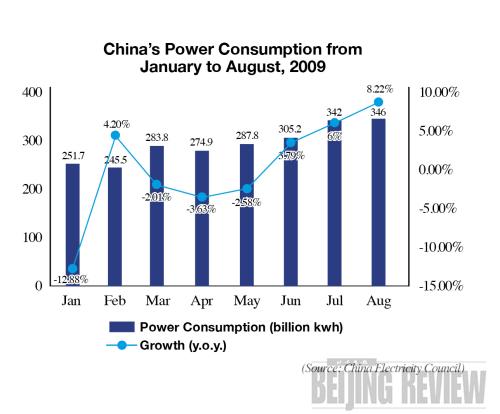| 
TO THE POINT: The Chinese central bank raises the red flag of bad debt risks from credit cards as default payments increase. China Investment Corp., the sovereign wealth fund, makes a push into commodities needed to feed humming economic machines. By handing out heavy tax breaks and financing incentives, China aims to assist ailing small businesses. The German industrial titan Siemens A.G. remains committed to the Chinese market despite the economic slowdown. Chinese home appliance makers take heart from government stimulus measures as they see a strong rebound in profits.
By HU YUE
Numbers of the Week
4.8%
China's industrial output value in the electronics sector rose 4.8 percent year on year in August, said the Ministry of Industry and Information Technology.
10.6%
The profits of China's industrial enterprises above designated size (with annual main business revenue of over 5 million yuan or $732,000) were down 10.6 percent year on year, the National Bureau of Statistics said.
Plastic Problems
Despite its reputation as a nation of savers, China is seeing a take-off in the use of credit cards. While the shift from save to spend is what policymakers would like to see at a time of tepid consumption, they also realize that risks are involved in the adoption of the plastic cards.
Consumers are using plastic to pay for an expanding array of goods and services as a credit culture begins to take shape in the country. The trend was encouraged by card-issuing banks that scrambled to capture a slice of the lucrative credit pie.
As of the end of this June, Chinese banks had issued more than 160 million credit cards, an average of 0.12 per person, according to a recent report of the People's Bank of China, the central bank.
While the acceptance of credit cards should be a cause for optimism, risks linger strong as cardholders are increasingly falling behind on their monthly obligations. The credit card debt that was overdue for at least six months was 5.77 billion yuan ($844.2 million), a 131.3-percent jump from one year earlier, said the report.
But the risks remain manageable due to a shallow market penetration, said Chen Jin, President of China CITIC Bank Credit Card Center. Just 14 percent of eligible customers have a credit card in China, compared to 81 percent in Hong Kong and 70 percent in Taiwan, according to a report from the accounting firm McKinsey & Co.
In addition, analysts believe the conservative spending culture is also establishing a firewall against risks.
Buying Mood
With two gleaming deals settled in less than one week, the scarred China Investment Corp. (CIC) is making a swift comeback.
On September 22, the $200-billion sovereign wealth fund announced it would pay $850 million for a 14.5-percent stake in the Noble Group Ltd., a Hong Kong-based trading firm listed in Singapore. As a multinational trade powerhouse, Noble maintains a global presence ranging from Brazilian sugar to Australian coal.
In another move, the Indonesian thermal coal producer PT. Bumi Resources Tbk. said on September 23 that the CIC had invested $1.9 billion to purchase its "debt-like" instruments.
The CIC seems to have regained a risk appetite as the deep downturn puts more deals within reach. After making a string of loss-making investments in Western financial institutions, the investment titan stayed largely on the sidelines. By holding to cash positions, it outperformed other big sovereign wealth and pension funds to report a minimum 2.1-percent loss on its overseas portfolio in 2008.
Analysts believe the buying rush is driven partly by the fundamental thirst of the Chinese economy for natural resources, as well as a pressing need to diversify away from the U.S. Treasuries.
"There are a lot of opportunities for the CIC and other sovereign wealth funds as the market turns around," said Jin Liqun, Chairman of Supervisory Board of the CIC.
"But as a long-term investor, we will continue to keep a balanced portfolio," he added.
Aiding SMEs
China is gearing up to staunch the woes of small and medium-sized enterprises (SMEs) through generous tax cuts and a massive boost to their financing.
The State Council, China's cabinet, has recently launched a guideline on how to lick the wounds of the small businesses, calling for better financial services for SMEs. As China continues to contend with the ripple effect of the global recession, these smaller firms are enduring a large share of the economic pain.
According to the guidelines, China will cut the corporate income tax rate from 25 percent to 20 percent for small businesses whose annual taxable income is less than 30,000 yuan ($4,392).
Those struggling small companies that fail to pay taxes on time can enjoy a three-month grace period, said the State Council.
| 